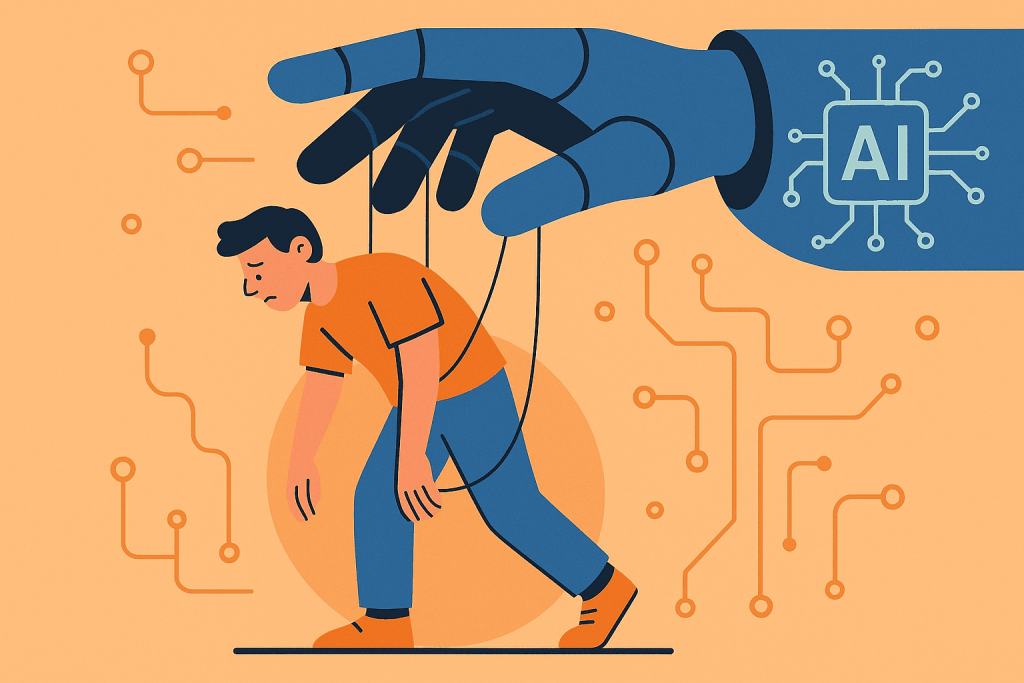
Just a few years ago, artificial intelligence seemed like an incredible achievement of humanity — a technology meant to make life easier. But now, as it has become a common element of our reality, a question arises more and more often: are we paying too high a price for this comfort? AI not only helps us — it changes our psyche, our perception of the world, and even the way we think. And these changes happen quietly, gradually, yet inevitably.
How Algorithms Reprogram the Mind
We constantly interact with systems that make decisions for us — what to read, who to listen to, what to pay attention to. Social media shapes our sense of reality, and the news feed becomes a mirror that reflects not the truth, but our own habits. AI adjusts to our emotions — and in doing so, it controls them.
Gradually, humans lose their ability to think critically: if an algorithm recommends a movie, article, or decision — it feels like the objectively right choice. This is how the phenomenon of “intellectual atrophy” emerges: the brain stops training because all analytical work is done by machines. Dependence on prompts becomes the norm, and independent thinking turns into an effort.
Emotional Isolation and the “Digital Loneliness” Effect
AI creates the illusion of communication but actually replaces it. We write to chatbots, listen to voice assistants, read automated replies — and get used to predictable, conflict-free interactions. However, the human psyche needs real emotions — tones, pauses, and uncertainty. Without them, the depth of connection disappears, and emotional emptiness appears.
Psychologists already speak about “digital loneliness” — a state where a person feels connected to technology but increasingly disconnected from other people. It manifests in fatigue, apathy, and the feeling that reality is less interesting than the virtual world. People who frequently use AI start seeking emotional validation even from machines, which gradually lowers their empathy.
Loss of Control and the Devaluation of the Self
When an algorithm knows more about us than we do ourselves, our sense of control begins to fade. We no longer understand why we see a particular ad, article, or suggestion. AI quietly shapes our worldview, and we simply accept it as our own. Thus, the illusion of choice is born — when every “independent” decision is the result of a calculation on someone else’s server.
Even more dangerous is the decline in self-esteem. Algorithms that imitate human creativity make us doubt our uniqueness. People start to feel that their thoughts, drawings, or texts are no better than machine-generated ones. This leads to anxiety, a sense of uselessness, and sometimes — real depression.
When Trust in the Machine Becomes a Threat
Stories of people blindly trusting artificial intelligence have already become global warnings. Cars that crashed due to autopilot errors. Medical systems that misinterpreted test results. Chatbots whose advice pushed users toward dangerous actions. The problem isn’t only in the algorithms — it’s in people’s willingness to give up responsibility.
We get used to thinking that the machine is smarter, more precise, more rational — therefore, better. But such trust can cost us our very sense of self. When AI makes the decisions and we only press “confirm,” the line between human and technology blurs. We no longer control the process — we become part of it.
How to Preserve Yourself in a World of Machines
AI is not evil, but its power needs balance. That balance can only come from conscious use — when technology assists humans, not replaces them. We shouldn’t reject innovation, but we must learn to set boundaries — to ensure AI remains a tool, not a mentor.
We should restore the skills we are slowly losing: critical thinking, empathy, the ability to question. We must remind ourselves that no algorithm can feel pain, joy, or love — and therefore, cannot decide for us what is right or important.
When Technology Must Be Returned to Humanity
If artificial intelligence affects us more than we think, the best strategy is not to fight it but to make it serve our own goals. To create systems that don’t simplify thinking, but help us think deeper.
That’s why the .ai domain has become a symbol of a new era — not a technological one, but a human one. It’s a space where you can create your own solutions that serve not corporations, but your ideas.
You can register your .ai domain on RX-NAME — and take the first step toward making technology work for you, not over you.

Leave a Reply